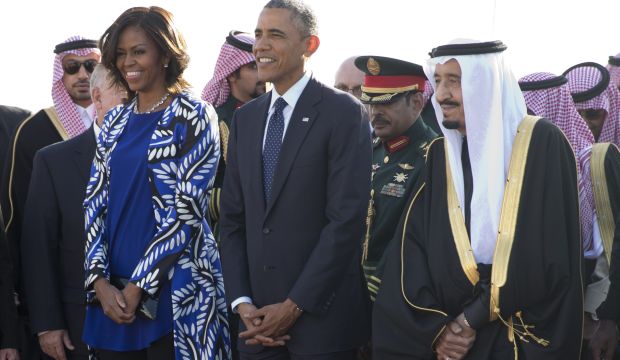
Saudi Arabia’s King Salman (R) greets President Barack Obama (C) and first lady Michelle Obama (L) at King Khalid International Airport in Riyadh, on January 27, 2015. (AP Photo/Carolyn Kaster)
King Salman, in his first official talks with a high-level foreign delegation since the death of his half-brother on Friday, did not express reservations over US-led negotiations aimed at curbing Iran’s nuclear program, a US official said.
It was unclear whether King Salman’s comments on the nuclear talks offered a hint of change. Saudi Arabia, the Middle East’s top Sunni power, has been anxious over the possibility that the talks would lead to a rapprochement between the United States and the Kingdom’s main rival, Shi’ite-led Iran.
King Salman said Tehran should not be allowed to build a nuclear weapon, the US official told reporters on Air Force One following a meeting between the leaders and dinner at Erga Palace in central Riyadh. A nuclear deal with Iran would be a major legacy achievement for Obama.
Obama cut short a trip to India to fly to Riyadh, canceling plans to visit the Taj Mahal.
He was joined on the four-hour visit by Secretary of State John Kerry and a bipartisan group of prominent current and former officials whose presence helped to convey the importance of a relationship that has endured on-off strains in recent years.
King Salman also signaled continuity in energy policies by the world’s top oil exporter, the US official said. The two discussed the stability of the oil market but not current low oil prices, the official added.
“He simply suggested they would continue to play their role within the global energy market as they have done and that we should not expect any difference in the Saudi position,” the US official said, referring to King Salman. “The message was one of continuity and commitment to caring for their traditional roles.”
Late last year, Saudi Arabia shocked oil markets by deciding not to cut production to shore up tumbling crude, opting to defend its market share against rising North American production rather than attempt to hold prices at around 100 US dollars a barrel
Obama’s visit came as Washington struggles with worsening strife in the Middle East, where it counts Saudi Arabia among its few steady partners in a campaign against Islamic State or Iraq and Syria (ISIS) militants who have seized swaths of both countries.
The US security headache worsened last week after Yemen’s government resigned under pressure by Iran-backed rebels, a setback to US efforts to contain Al-Qaeda in that country and to limit the regional influence of Shi’ite Iran.
The Yemen government’s collapse is of deep concern to Saudi Arabia because of their common border and because of the advance of Iran. The leaders discussed Yemen, the US official said.
Saudi Arabia’s role in rallying Arab countries to join a coalition against ISIS has won praise in Washington, which along with other Western nations values the Kingdom as an important market for its defense industries.
Despite an alliance between the two countries that has long been a cornerstone of US Middle East policy, the Kingdom has made clear its impatience with the Obama administration’s failure to do more to oust Syrian leader Bashar Al-Assad and its anxiety over US-led nuclear negotiations with Iran.
This added to a sense among Saudi rulers that Obama was neglecting old Arab allies. US–Saudi relations have improved in recent months after Obama made a fence-mending visit to Riyadh last March.
Even though the United States is now less dependent on Saudi oil supplies thanks to a domestic production boom, the Kingdom’s willingness to keep output high despite tumbling global oil prices has bolstered Obama’s domestic economic recovery efforts as well as his strategy of keeping pressure on oil producers Russia and Iran. Both those nations are under international sanctions.
